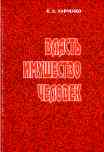
Kharchenko, Konstantin. Power-Property-Human: The Property Redistribution in bolshevik Russia
1917 - early 1921. - Russkiy Dvor, Moskow, 2000. - 264 p.

| Order! |
- The city of Belgorod is imagined like Russian out-of-the-way place by Muscovites and simultaneously like megapolis by rural dwellers arriving here. When the utterance "I am from Belgorod" sounds, Muscovites think that it lies anywhere in Ukraine, as foreigners suppose that it is a Yugoslavian city.
In some way or other, Belgorod is situated in the central part of Russia, more precisely, in Central Black Earth region, 700 kilometers to the southwest of Moscow, on the Severskiy Donets river, a tributary of the Don. It has a population of over 380,000. - The word of 'Belgorod', like the name of Finnish capital, means 'White town'. When trains drop in to Belgorod station from Moscow, the landscape with chalky hills is discovered. Our drinking water contains as well much of chalk that accumulates down after the boiling. There had been probably a sea on this locality during the Cretaceous era, and then mollusks reduced to chalk.
- How old is Belgorod? They were considering for a long time that the town was founded in 1596 when a fortress had been built near the river of Severskiy Donec. Meanwhile, just before celebrating its 400 years' anniversary in 1996, two posters appeared on shop windows. One of them told that Belgorod is 400 years old, but the other added to the town's age 600 years more. As it has become known, Yuri Shmelev, an amateur of regional studies, interpreted chronicles under his own account and concluded that Belgorod had been founded by prince Vladimir the Baptist in 996. In spite of the fact that a St.-Petersburg researcher, like many other historians, had revealed the groundlessness of this conclusion, since that 'discovery' a monument of prince Vladimir--''the founder of Belgorod''--have elevated upon the city.
Until 1954 Belgorod and its district was included into the Kursk region. This circumstance leaved the nonerasable imprint in topography: all important events and occurrences that have had place on our land was named with the epithet of 'Kursk'--such as the Kursk battle, the Kursk magnetic anomaly.
- Unfortunately, Belgorod has lost its historical core during both the wartime and Bolshevik experiments. Until 1917 the sixteen churches have risen above the tiny town, but before 1988--by the time of rechristianization--almost all of them have been destroyed or shut down. One can rarely meet here the houses built earlier the midst of the twentieth century. The architecture is largely of the postwar period. This way, there were built so many houses named 'khrushchovki' (these darkgray plain buildings have been appeared in each Russian town in the 1950s, when Nikita Khrushchov, the secretary first of KPSU, had ordered to erect all buildings extremely rapidly and simply to solve the housing problem). Likewise, one can see 'brezhnevki' (more higher white boxes were up within the 70-80s) and the samples of nowadays architecture - comfortable buildings for businessmen, or 'new Russians'.
- The role of Belgorod region have vastly increased just in the last decade. In part, since 1992 it has become a boundary city. At the moment, because of the customs control, the trains from Moscow, Ukraine, and the Caucasus are stopping here for 40 minutes against 2 minutes they did earlier.
- Belgorod of the present looks like a great building area. It holds the second-place position after Moscow in the total amount of housing construction. The governor and mayor approach carefully to the view of Belgorod: the pavement is being covered with tile, roads are being dilated, and old trees are being sawed away.
- Mass flow of migrants from the former Soviet republics--where Russian population is subjected an intense discrimination--serves as an indicator of relatively favorable stature of the regional economy.
- Being in Belgorod, Vladimir Zhirinovskiy, Russian politician, proposed an amusing and utopian project: to amalgamate Belgorod with Kharkov and, thus, establish a new capital of the reconstituted Soviet Union.
- Evgeniy Savchenko, a governor of Belgorodskaya oblast' (district), aims to turn Belgorod into university city. In Fall 2001, a new building of Belgorod State University have been passed. It is equipped with an observatory, botanical gardens, and a chapel.